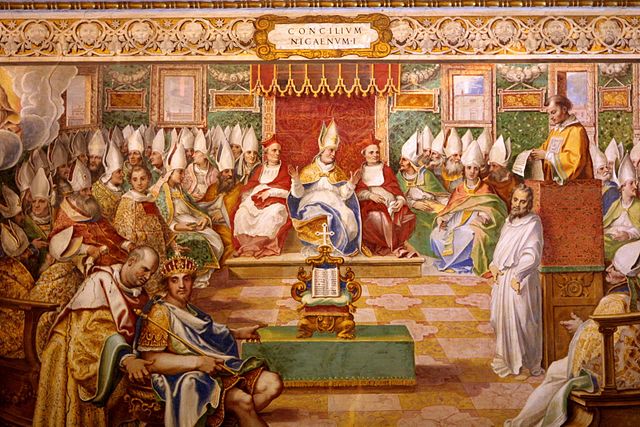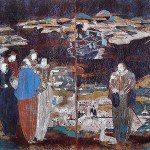
Fresco of the Council of Nicaea (325), from the Sistine Chapel, Vatican (1590) [public domain / Wikimedia Commons]
***
(August 1997)
***
***
That historian is Warren H. Carroll, who holds a Ph.D. in history from Columbia, and who founded Christendom College in Front Royal, VA, in 1977. He is currently writing a major multi-volume, copiously-documented and footnoted “History of Christendom.” His second volume is entitled The Building of Christendom (Christendom College Press, 1987). It covers the period from 324-1100 in the space of 616 pages, of which approximately 148 (roughly a quarter) consist of extensive footnotes and bibliographies. These considerations, in my mind, would strongly suggest a “serious” historian at work, by any reasonable criteria, whatever an anti-Catholic might think of him.
Anti-Catholics and other more ecumenical non-Catholics may want to claim that Carroll’s motivation is “solely theological,” since he is an orthodox Catholic, and/or that his orthodoxy thereby disqualifies him as an objective, detached scholar. But this would be as silly as saying that because someone happens to be a conservative, orthodox Calvinist who defends Reformation Protestantism over against Catholicism, therefore his conclusions and arguments are, ipso facto, inherently suspect; or, by the same deficient reasoning, that conservative biblical scholars such as F. F. Bruce are not to be trusted because they deny the higher critical theories and hostile presuppositions of liberal scholars. Having a strong theological view by no means disqualifies anyone as a trustworthy scholar. In fact, quite the opposite: better to make one’s bias (which everyone has) apparent up-front than to attempt to hide it or deny its existence. That said, let’s see what Carroll has to say on this subject:
The recommendation for a general or ecumenical council . . . had probably already been made to Constantine by Ossius [aka Hosius], and most probably to Pope Silvester as well (9). . . Ossius presided over its deliberations; he probably, and two priests of Rome certainly, came as representatives of the Pope. (10) (p. 11)
[The rest is the material of two footnotes related to the above remarks]:
9. Victor C. De Clercq, Ossius of Cordoba (Washington, 1954), pp. 218-226; Charles J. Hefele, A History of the Councils of the Church, ed. William R. Clark (Edinburgh, 1894), I, pp. 269-270.
De Clercq thinks that Ossius had already recommended the council to Constantine before the synod of Antioch [March or April 325], which merely joined in the prior recommendation; in view of the close relationship between Ossius and Constantine . . ., this would seem probable . . .
That Pope Silvester I was informed from the first about plans for the Council of Nicaea there is no good reason to doubt, however much its likelihood may be downplayed by sectarian prejudice or in misplaced deference to ecumenism among the current generation of historians . . .
We know that later, at the 6th Ecumenical Council in Constantinople (680), it was stated as accepted fact – though very much against the interest of the partisans of the episcopate of Constantinople, where the Council was held, who sought to build up their see as a rival to Rome – that ‘Arius arose as an adversary to the doctrine of the Trinity, and Constantine and Silvester immediately assembled the great Synod of Nicaea’ (Hefele, loc. cit.) . . .
Constantine’s personal role in the calling of the Council of Nicaea does not, from the available evidence, seem to be any greater than the personal role of Emperor Charles V in convening the earlier sessions of the Council of Trent . . .
10. De Clercq, Ossius, pp. 228-250; Hefele, Councils, I, 36-41; Timothy D. Barnes, Constantine and Eusebius (Cambridge, MA, 1981), pp. 214-215. De Clercq’s arguments on this often controverted point are powerfully convincing; his conclusion, that Ossius’ representing Pope Silvester at Nicaea is only a ‘possibility,’ is too modest or too cautious or both. The whole history of the calling of the Council of Nicaea, and the whole history of the Church in the empire for the preceding decade, suggest that Pope Silvester would have designated Ossius for this role. At the Ecumenical Council of Ephesus a century later, Bishop Cyril of Alexandria presided and signed the acts of the Council first, without reference to his role as chief representative of the Pope, and his signature was immediately followed by those of two bishops and a priest specifically designated as representing the Pope – just as in the acts of the Council of Nicaea, Ossius signed first as presiding officer without reference to his representing the Pope, followed by two priests identified as the Pope’s legates. The two situations are exactly parallel; yet in the case of the Council of Ephesus we know for a fact that Cyril of Alexandria had been designated the Pope’s representative. The whole creates a strong presumption that the same was true of Ossius at Nicaea. (pp. 33-34)
Also, the Encyclopedia Britannica (1985 ed.), informs us (under “Hosius,” v. 6, p. 77): “Prompted by Hosius, Constantine then summoned the first ecumenical Council of Nicaea (325) . . .”
The Oxford Dictionary of the Christian Church (ed. F. L. Cross, 2nd edition, Oxford Univ. Press, 1983, p. 668), a very reputable non-Catholic reference, largely concurs:
. . . from 313 to the Council of Nicaea [Hosius] seems to have acted as ecclesiastical adviser to the Emperor Constantine . . . it was apparently in consequence of his report that the Emperor summoned the Nicene Council. There are some grounds for believing that here he presided, and also introduced the Homoousion.
Finally, Catholic apologist David Palm, added in a letter of 7-16-97:
Here is a quotation from Gelasius [of Cyzicus] the Eastern priest-historian writing about A.D. 475, stating explicitly that Hosius the bishop of Cordova was in effect a papal legate at the council of Nicea. So much for the notion that the popes did not preside at the earliest councils. The translation is mine; it’s fairly literal but functional, I hope:
Hosius himself, the famous Beacon of the Spaniards, held the place of Sylvester, bishop of great Rome, along with the Roman presbyters Vito and Vincent, as they held council with the many [bishops]. (Patrologia Graece 85:1229)
Furthermore, This Rock magazine (p. 27, June 1997), offers the following information:
The Graeco-Russian liturgy, in the office for Pope Silvester, speaks of him as actual head of the Council of Nicaea:
Thou hast shown thyself the supreme one of the Sacred Council, O initiator into the sacred mysteries, and hast illustrated the Throne of the Supreme One of the Disciples.
(From Luke Rivington, The Primitive Church and the See of Peter, London: Longmans, Green, 1894, p. 164)
The following is a reply from Dr. Warren Carroll, to a critical post by an Orthodox participant in my discussion list, dated 8-19-97:
I also urge you to review the last four chapters of Volume I, The Founding of Christendom, which present the very strong evidence that the Bishop of Rome did have authority over the whole Church from the beginning, the first specific indicator being the letter of Pope Clement I to the Corinthians about 95 A.D., then a passage from St. Irenaeus in his Against Heresies, then the decree of Pope Victor I (about 200) prescribing the date for celebrating Easter, as against the date then being used in Asia Minor (now Turkey). Both Pope Clement’s letter to the Corinthians and Pope Victor’s decree rejecting the use of the 14th day of the month Nisan to celebrate Easter in Asia Minor, are exercises of the Pope’s universal jurisdiction in the Church, far outside Italy. The situation at the Council of Nicaea has to be judged with these background facts in mind.
It is true, and I state, that there is no specific evidence that Ossius was specifically designated as a papal representative at Nicaea. But I maintain that it is highly probable, for the reasons given. Ossius may very well have been–in fact, I would say that he probably was–suggested or even “nominated” as president of the Council by Emperor Constantine, who obviously had complete confidence in him. But since the Pope sent two men to represent him at the Council, it seems unreasonable to me that he would not have confirmed the presiding officer if he were not to designate one of his representatives for that position.
The records of the Council make it clear that Ossius, not Constantine, presided (Eusebius’ vague reference to “several presidents” cannot stand against the records of the Council itself). Constantine was present and did intervene; he promised the Council of Nicaea his support and protection, which he gave it; it might well not have been held but for him. But the presence of papal representatives, specifically designated as such, means it must have had at least the Pope’s approval, otherwise he would not have sent them. All the successful ecumenical councils of the first six centuries of the Church required the cooperation of both Pope and Emperor, and we know that all the others had that. Only for Nicaea, because of our dearth of information about Pope Silvester, is there room for doubt about the Pope’s role.













